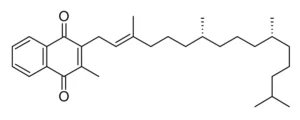Vitamin K1

Origin
Vitamin K1 is synthesized from chorismate, a compound that originates from shikimate via the shikimate pathway. Predominantly produced by plants, it is found in the highest concentrations in green leafy vegetables due to its critical role in photosynthesis.
Also Known As
Vitamin K1 is recognized by several chemical names:
- Phytomenadione
- Phylloquinone
Usages
Vitamin K1 is essential for:
- Treating bleeding disorders, including warfarin overdose and vitamin K deficiency
- Addressing obstructive jaundice
- Preventing and treating hemorrhagic disease of the newborn
Overview
Vitamin K1, the primary dietary form of Vitamin K, plays a pivotal role in blood clotting and bone health. It’s used therapeutically for various bleeding disorders and to ensure proper development in newborns. Key points about Vitamin K1 include:
- Critical for blood clotting and bone metabolism
- Used to correct warfarin overdose and vitamin K deficiency
- Essential in preventing hemorrhagic disease in newborns
Common Dosage
The typical dosage range for Vitamin K1 varies from 2.5 mg to 10 mg, depending on the specific health condition being addressed.
Summary
Vitamin K1 is a vital nutrient with significant health benefits, particularly in blood clotting and bone health. Derived from plants and abundant in green leafy vegetables, it supports various therapeutic needs from treating bleeding disorders to newborn care. Key takeaways:
- Integral for blood clotting and bone health
- Therapeutically used for bleeding disorders and newborn care
- Recommended dosage ranges between 2.5 mg and 10 mg
For more information, call Nutrasky today.







